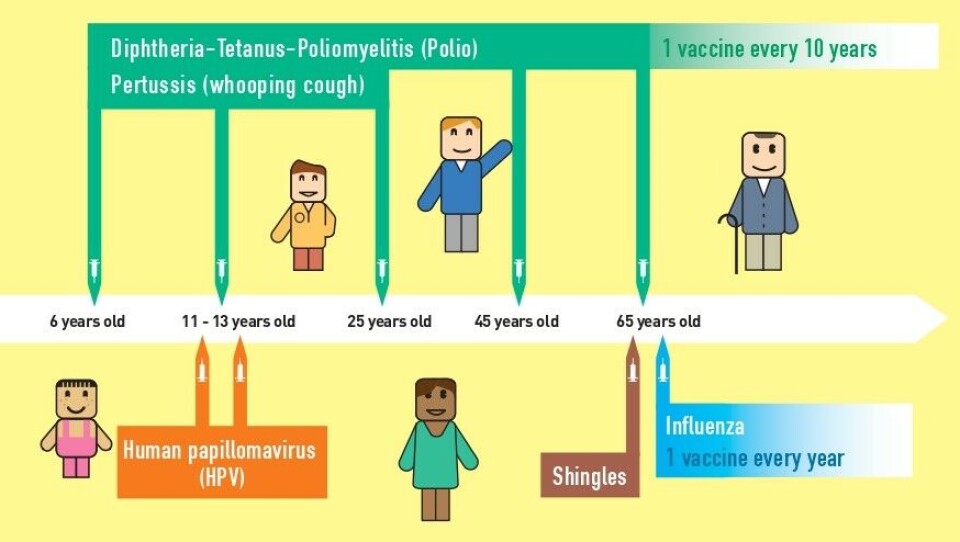-
Three French regions at pre-epidemic stage for flu
Public health authority advises people to get vaccinated
-
France urges flu vaccination after 17,000 deaths last winter
Last year’s season was particularly severe due to ‘low vaccination coverage’, experts say
-
Plan to recycle unused medicines in France could save €1.5 billion a year
Products returned to pharmacies to be repackaged then resold under health minister's plan
Newcomers should follow French vaccination schedule for these diseases
Are you up to date with these other booster jabs recommended for people living in France?

Since the arrival of the first Covid vaccine, we have seen how vastly public health guidelines differ from country to country – and this also applies to other injections.
Read more: How do I get a shingles vaccination in France?
Read more: Have you had all the vaccinations recommended by France? Check here
Adult booster jabs in French vaccination schedule
French health authorities recommend a certain number of booster jabs for most adults and, if you have moved here from abroad, you might not realise your new home has different advice.
The Ministry of Health confirmed to The Connexion that the French vaccination schedule applies to all residents and so foreigners living in France should follow the local recommendations.
11 mandatory jabs for children
It might come as a surprise, considering France is known to be one of the most vaccine-hesitant countries in the world, but when it comes to vaccinating newborns, the French are more stringent than the UK and take a similar stance to most US states.
Since 2018, there are 11 mandatory vaccines for children born after that date, including the measles, mumps and rubella (MMR) vaccine.
Vaccines recommended for adults
There are also a number of vaccines recommended for adults. These are:
- Diphtheria, tetanus and polio (DTP) booster at the age of 25, again at 45 and 65, and once every 10 years from 65;
- Whooping cough booster at age 25;
- Flu vaccine every year from 65;
- One dose of the shingles vaccine between the ages of 65 and 74.
This differs from the guidance given by other countries.
US recommendations
The state recommends adults receive a Td (tetanus and diphtheria) or Tdap (Td, plus whooping cough) booster every 10 years, an annual flu vaccine for anyone aged six months or older, and two doses of the shingles vaccine from age 50.
It also lists additional vaccines, such as varicella and Hepatitis B, which are not recommended for adults in France.
UK recommendations
The NHS suggests getting the flu vaccine every year from the age of 50, the shingles vaccine at 70, and also the Pneumococcal (PPV) vaccine at age 65.
Most people in the UK are not advised to get the boosters recommended in France, although pregnant women should have a whooping cough jab.
Newcomers may be ‘out of sync’ with French schedule
These contrasting guidelines can lead to confusion for newcomers as to whether booster shots are necessary.
For example, somebody arriving from the UK aged 35 will most likely have had their last DTP jab aged 14, when someone the same age who has always lived in France should have had a top-up at 25.
Should they get the booster 10 years late?
The Health Ministry said: “A person aged 25 or over whose last booster was administered before the age of 19 should receive their booster immediately.
“For people whose last booster was given between ages 20 and 25, the next injection will be at 45.”
If you have any doubts about a particular vaccine, you should talk this through with your GP and, if possible, bring a record of your previous vaccinations.
Reimbursements
If you have a carte Vitale, the French state will reimburse 65% of the cost of vaccines prescribed by your doctor, and if you have a mutuelle, this should cover the rest.
Certain vaccines are fully covered, such as the flu jab for at-risk groups, including those over 65.
The appointment itself to receive the injection is 70% reimbursed by the Assurance Maladie.
Keeping a record
Most people in France keep a record of past vaccinations in their carnet de santé, a health record book issued at birth.
While children arriving in France may be able to obtain a carnet de santé, depending on their age and the other documents in their possession, foreign adults can use a carnet de vaccination.
You can request this at your GP’s office, or download it here.
Those who have a carte Vitale can also maintain their health records, including vaccinations, digitally via the Mon espace santé website, which was launched earlier this year.
Read more: ‘Your online French health space is ready’: is this message a scam?
Everybody registered in the French system should have received a code to activate their account.
As long as you did not actively refuse, it will have been automatically created after six weeks.
A simplified version of the French vaccination schedule is accessible, in English.
A more detailed version is available in French, including more specific guidance for at-risk groups.
Related articles
Nurses, pharmacists and midwives given right to vaccinate in France
What next as state-of-emergency Covid measures end in France?
Monkeypox virus: France launches phone info line as cases spread
























